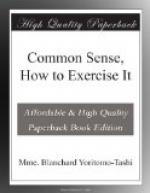“This is a calumny which is spread broadcast by fools who scatter their lives to the four winds of caprice and extravagance.
“Not only does common sense not exclude beauty, but it really aids in its inception and protects its growth by maintaining the reasons which produced its appearance.
“Without it, the reign of the most admired things would be of short duration, granting that the want of logic had not prevented their production.
“What is there more commendable than the love of work, devotion to science, ambition to succeed?
“Could all this exist if common sense did not intervene to permit the development of the deductions on which are based the resolutions that inspired in us these aspirations.
“But this is not all; without logic, which permits us to give them solidity, the most serious resolutions would soon become nothing but vague projects, shattered as soon as formed.
“In common sense lies the cause and the object of things.
“It is common sense which makes us realize that difference that few persons are willing to analyze, and which lies between judgment and opinion.
“We almost always succeed in readily confounding them, and from this mistake results a too-frequent cause of failures.
“Opinion is a conviction which is capable of modification.
“In addition to this, as it is based on mere indications and probability, it is rarely free from the personal element.
“Opinion depends upon the favorite inclination, upon the mood of the moment, upon sundry considerations, which direct it almost always toward the desired solution.
“Also it depends often on thoughtfulness or on the inexactness of the initial representation, which we are pleased to disguise slightly at first, then little by little to color in accordance with our desires.
“Falsehood does not necessarily enter into this process of tricking things out; it is, three-quarters of the time, the result of an illusion which we are prone to perpetuate within us.
“We are too often in the position of the three wise men who, while rummaging in an old sarcophagus, discovered a vase whose primitive function they were unable to determine with any certainty.
“One of them was a poet and an idealist.
“The second only prized positive things.
“The third belonged to the category of melancholy people.
“After a few days devoted to special research work, they met together again in order to communicate to each other their different opinions about the exhumed vase.
“‘I have found the secret,’ said the first.
“‘I also,’ affirmed the second.
“‘I equally have found it,’ replied the third.
“And each one based his opinion on preconceived notions which reflected their bent of mind:
“‘This vase,’ said the first, ’was intended to hold incense, which they burned a that epoch, in the belief that the smoke dispelled the evil spirits.’




